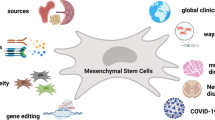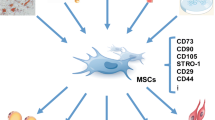A culture of cells expressing markers of mesenchymal stem cells (MSC) (CD73, CD90, CD44, CD29, and CD49b), but not hematopoietic cell markers, and capable of multilineage differentiation was isolated from the deciduous tooth pulp. Co-culturing with immature dendritic cells in the presence of LPS did not reveal an ability of the MSC to suppress the maturation of dendritic cells. On the contrary, co-culturing of MSC with monocytes in the presence of granulocyte-macrophage CSF and IL-4 led to complete suppression of monocyte differentiation into dendritic cells. However, long-term culturing of MSC from dental pulp showed that by the passage 11, they almost completely lose their suppressor ability. These results indicate that the immunological properties of MSC can change during culturing without changing their phenotypic markers. This should be taken into account when creating biomedical cell products.
Similar content being viewed by others
References
Han Y, Li X, Zhang Y, Han Y, Chang F, Ding J. Mesenchymal Stem Cells for Regenerative Medicine. Cells. 2019;8(8):886. doi: https://doi.org/10.3390/cells8080886
Samsonraj RM, Raghunath M, Nurcombe V, Hui JH, van Wijnen AJ, Cool SM. Concise review: multifaceted characterization of human mesenchymal stem cells for use in regenerative medicine. Stem Cells Transl. Med. 2017;6(12):2173-2185. doi: https://doi.org/10.1002/sctm.17-0129
Mo M, Wang S, Zhou Y, Li H, Wu Y. Mesenchymal stem cell subpopulations: phenotype, property and therapeutic potential. Cell Mol. Life Sci. 2016;73(17):3311-3321. doi: https://doi.org/10.1007/s00018-016-2229-7
Purwaningrum M, Jamilah NS, Purbantoro SD, Sawangmake C, Nantavisai S. Comparative characteristic study from bone marrow-derived mesenchymal stem cells. J. Vet. Sci. 2021;22(6):e74. doi: https://doi.org/10.4142/jvs.2021.22.e74
Ong WK, Chakraborty S, Sugii S. Adipose tissue: understanding the heterogeneity of stem cells for regenerative medicine. Biomolecules. 2021;11(7):918. doi: https://doi.org/10.3390/biom11070918
Huang GT, Gronthos S, Shi S. Mesenchymal stem cells derived from dental tissues vs. those from other sources: their biology and role in regenerative medicine. J. Dent. Res. 2009;88(9):792-806. doi: https://doi.org/10.1177/0022034509340867
Yarygin KN, Lupatov AY, Sukhikh GT. Modulation of immune responses by mesenchymal stromal cells. Bull. Exp. Biol. Med. 2016;161(4):561-565. doi: https://doi.org/10.1007/s10517-016-3461-8
Hwang JJ, Rim YA, Nam Y, Ju JH. Recent developments in clinical applications of mesenchymal stem cells in the treatment of rheumatoid arthritis and osteoarthritis. Front. Immunol. 2021;12:631291. doi: https://doi.org/10.3389/fimmu.2021.631291
English K, Wood KJ. Mesenchymal stromal cells in transplantation rejection and tolerance. Cold Spring Harb. Perspect. Med. 2013;3(5):a015560. doi: https://doi.org/10.1101/cshperspect.a015560
Nobari S, Rezvan M, Dashtestani F, Gangi M, Keshmiri Neghab H. Cellular therapy: the hope for Covid-19. Avicenna J. Med. Biotechnol. 2022;14(2):104-113. doi: https://doi.org/10.18502/ajmb.v14i2.8883
Christopherson K 2nd, Hromas R. Chemokine regulation of normal and pathologic immune responses. Stem Cells. 2001;19(5):388-396. doi: https://doi.org/10.1634/stemcells.19-5-388
Jiang XX, Zhang Y, Liu B, Zhang SX, Wu Y, Yu XD, Mao N. Human mesenchymal stem cells inhibit differentiation and function of monocyte-derived dendritic cells. Blood. 2005;105(10):4120-4126. doi: https://doi.org/10.1182/blood-2004-02-0586
Lupatov AYu, Karalkin PA, Moldaver MV, Burunova VV, Poltavtseva RA, Gabibullaeva ZG, Pavlovich SV, Yarygin KN, Sukhikh GT. Bone marrow mesenchymal stem cells suppress differentiation of allogeneic dendritic cells in vitro and do not affect their maturation. Immunologiya. 2011;32(3):122-127. Russian.
Dominici M, Le Blanc K, Mueller I, Slaper-Cortenbach I, Marini F, Krause D, Deans R, Keating A, Prockop Dj, Horwitz E. Minimal criteria for defining multipotent mesenchymal stromal cells. The International Society for Cellular Therapy position statement. Cytotherapy. 2006;8(4):315-317. doi: https://doi.org/10.1080/14653240600855905
Kamata T, Takada Y. Direct binding of collagen to the I domain of integrin alpha 2 beta 1 (VLA-2, CD49b/CD29) in a divalent cation-independent manner. J. Biol. Chem. 1994;269(42):26 006-26 010.
Lupatov AY, Karalkin PA, Suzdal'tseva YG, Burunova VV, Yarygin VN, Yarygin KN. Cytofluorometric analysis of phenotypes of human bone marrow and umbilical fibroblast-like cells. Bull. Exp. Biol. Med. 2006;142(4):521-526. doi: https://doi.org/10.1007/s10517-006-0407-6
Xu Y, Wang AT, Xiao JH. CD44 mediates hyaluronan to promote the differentiation of human amniotic mesenchymal stem cells into chondrocytes. Biotechnol. Lett. 2023;45(3):411-422. doi: https://doi.org/10.1007/s10529-022-03322-2
Spaggiari GM, Abdelrazik H, Becchetti F, Moretta L. MSCs inhibit monocyte-derived DC maturation and function by selectively interfering with the generation of immature DCs: central role of MSC-derived prostaglandin E2. Blood. 2009;113(26):6576-6583. doi: https://doi.org/10.1182/blood-2009-02-203943
Jung YJ, Ju SY, Yoo ES, Cho S, Cho KA, Woo SY, Seoh JY, Park JW, Han HS, Ryu KH. MSC-DC interactions: MSC inhibit maturation and migration of BM-derived DC. Cytotherapy. 2007;9(5):451-458. doi: https://doi.org/10.1080/14653240701452057.
Lupatov AY, Saryglar RY, Vtorushina VV, Poltavtseva RA, Bystrykh OA, Chuprynin VD, Krechetova LV, Pavlovich SV, Yarygin KN, Sukhikh GT. Mesenchymal stromal cells isolated from ectopic but not eutopic endometrium display pronounced immunomodulatory activity in vitro. Biomedicines. 2021;9(10):1286. doi: https://doi.org/10.3390/biomedicines9101286
Saryglar RY, Lupatov AY, Yarygin KN. Colorectal cancer and tumor stromal cells have different effects on the differentiation and maturation of dendritic cells in vitro. Bull. Exp. Biol. Med. 2023;174(4):533-537. doi: https://doi.org/10.1007/s10517-023-05743-z
Author information
Authors and Affiliations
Corresponding author
Additional information
Translated from Kletochnye Tekhnologii v Biologii i Meditsine, No. 4, pp. 249-256, December, 2023
Rights and permissions
Springer Nature or its licensor (e.g. a society or other partner) holds exclusive rights to this article under a publishing agreement with the author(s) or other rightsholder(s); author self-archiving of the accepted manuscript version of this article is solely governed by the terms of such publishing agreement and applicable law.
About this article
Cite this article
Lupatov, A.Y., Vakhrushev, I.V., Saryglar, R.Y. et al. Mesenchymal Stem Cells from the Deciduous Tooth Pulp Lose their Ability to Suppress the Differentiation of Dendritic Cells during Long-Term Culturing. Bull Exp Biol Med 176, 672–679 (2024). https://doi.org/10.1007/s10517-024-06089-w
Received:
Published:
Issue Date:
DOI: https://doi.org/10.1007/s10517-024-06089-w




